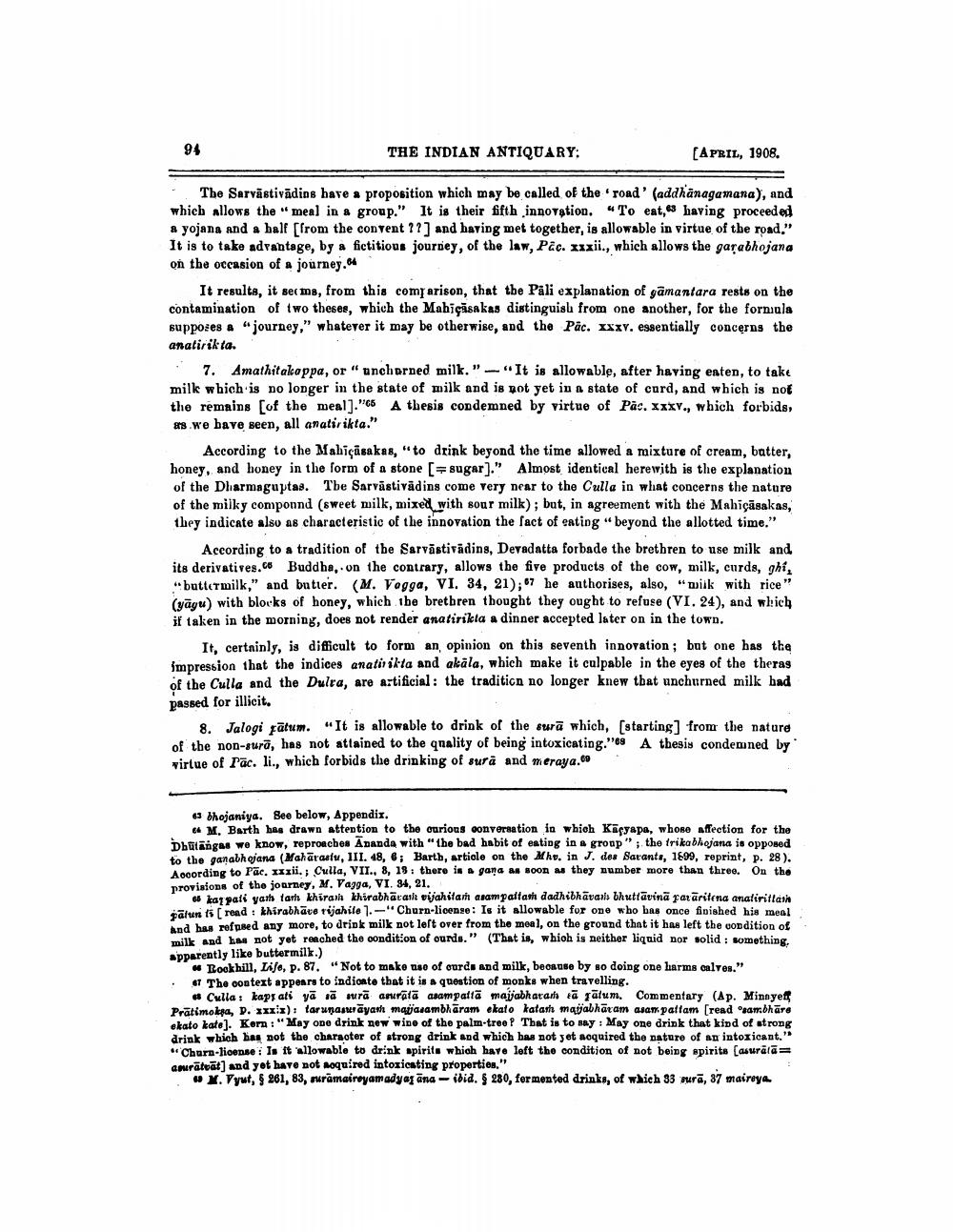________________
94
THE INDIAN ANTIQUARY:
[APRIL, 1908.
The Sarvāstivādins have a proposition which may be called of the road' (addhanagamana), and which allows the meal in a group." It is their fifth innovation. "To eat, having proceeded a yojana and a balf (from the content ??] and having met together, is allowable in virtue of the road." It is to take advantage, by a fictitious journey, of the law, Pac. xxxii., which allows the garabhojana on the occasion of a journey.
It results, it seems, from this comparison, that the Pali explanation of gamantara rests on the contamination of two theses, which the Mahicāsakas distinguish from one another, for the forniala supposes a "journey," whatever it may be otherwise, and the Pac. xxxv. essentially concerns the anatirikta.
7. Amathitakappa, or "unchorned milk."-"It is allowable, after having eaten, to take milk which is no longer in the state of milk and is pot yet in a state of card, and which is not the remains of the meal]."65 A thesis condemned by virtue of Pac. xxxv., which forbids, as we have seen, all anatirikta."
According to the Mahicasakas, " to drink beyond the time allowed a mixture of cream, batter, honey, and honey in the form of a stone [=sugar)." Almost identical herewith is the explanation of the Dharmaguptas. Tbe Sarvāstivādins come very near to the Culla in what concerns the nature of the milky componnd (sweet milk, mixed with sour milk); but, in agreement with the Mahicāsakas, they indicate also as characteristic of the innovation the fact of eating " beyond the allotted time."
According to a tradition of the Sarvāstivāding, Devadatta forbade the brethren to use milk and its derivatives.c6 Buddha, on the contrary, allows the five products of the cow, milk, curds, ghi,
buttermilk," and butter. (M. Vagga, VI. 34, 21); 67 he authorises, also, ik with rice": (yāgu) with blocks of honey, which she bretbren thought they ought to refuse (VI. 24), and which if taken in the morning, does not render anatirikla a dinner accepted later on in the town.
It, certninly, is difficult to form an, opinion on this seventh innovation ; but one has the impression that the indices anatir ikta and akāla, which make it culpable in the eyes of the theras of the Culla and the Dulra, are artificial: the tradition no longer knew that unchurned milk had passed for illicit.
8. Jalogi rātum. "It is allowable to drink of the surā which, [starting from the nature of the non-surā, has not attained to the qnality of being intoxicating." A thesis condemned by virtue of rac. li., which forbids the drinking of surà and meraya.com
63 bhojaniya. Bee below, Appendix.
* M. Barth has drawn attention to the curious conversation in which Kaçyapa, whose affection for the Dhutangas we know, reproaches Ananda with "the bad habit of eating in a group" , the frikabhojana is opposed to the ganabhojana (Mahārantu, III. 48, 6; Barth, article on the Mhu. in J. des Sarante, 1699, reprint, p. 28). Anoording to l'ac. xxii. Culla, VII., 8, 18: there is a gana an soon as they number more than three. On the provisions of the journey, M. Vagga, VI. 84, 21.
66 tasoati vath fath khirazh khirabhāvash vijahitan asampaltath dadhibhavail bhuttavina rararilena analiritlash palun road:khirabhate jahile 1. "Churn-lioenge: Is it allowable for one who bas once finished his meal
a herofred any more, to drink milk not left over from the meal, on the ground that it has left the condition of
IL and not yet reached the oondition of ounds." (That is, whioh is neither liquid nor solid : something. apperently like buttermilk.)
Rookhill, Lilo, p. 87. "Not to make use of ourds and milk, because by so doing one harms calves." • 1 The context appears to indionte that it is question of monks when travelling.
#Culla: kapsali yā rā surā aruratā asampaltā maijabharan tā rātum. Commentary (Ap. Minayet Prātimoka, D. xxx:x): tarunasurāyan majja ambkāram ekato katam majabhāram asam pattam [read sam.bhāre ekato kate). Kern: "May one drink new wine of the palm-tree? That is to say: May one drink that kind of strong drink which is not the character of strong drink and which has not yet acquired the nature of so intoxicant."
Charn-license: Is it allowable to drink spirits which have left the condition of not being spirits (asuralā= apurātvāt] and yet have not soquired intoxicating properties."
- X. Vyut, 261, 83, rurāmairoyamadyas āna - ibid. $ 280, fermented drinks, of which 33 murā, 37 maireye




